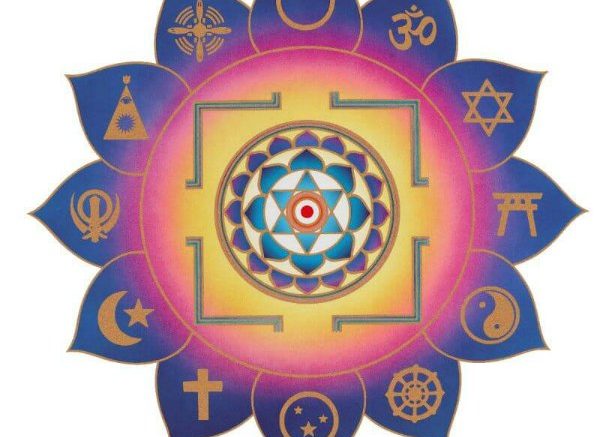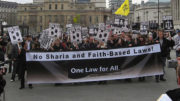 Article 6 in a Series (see full lnterfaith list here)
Article 6 in a Series (see full lnterfaith list here)
By Dan Wolf
This article touches on God’s nature. Within Judeo-Christian tradition, the question is ‘Who is God?’. Within Islam the question becomes ‘What is God?’ Some of the significant differences between Allah and God have already been discussed in Part 2, A Christian Perspective. However, there are a couple more quick points to add before turning to Jesus.
God’s Oneness
From Islam Is … again. “In Islam everything is built on the oneness of God.”1 This oneness is so simple and pure that it allows no room for the persons of Father, Son and Holy Spirit within God’s Single Essence. Why? Because God is so simple and pure that Allah is only will, without any Being, Essence, or Nature. This view of God leads to the notion within Islam that “[I]t is forbidden to attribute to God characteristics of His creation. The only attributes that may be ascribed to God are the ones He revealed Himself in the Qur’an or those used by the Prophet to describe Him.”2 Even these attributes are not a part of Allah’s nature, but only things Allah causes.
However, Islam contradicts its own view of God. The Qur’an is Allah’s eternal word. It is Allah, but separate from Allah. This is the very idea of the relationship between God the Son (Jesus) and God the Father. In one case the argument is accepted, and the other it is denied. You cannot have it both ways. More about this below.
The second point is that “Arabic speaking Jews and Christians also call God by the name Allah.”3 Both also use ‘The God of Abraham.’ Just because Islam uses the same word does not indicate it means the same thing to someone who does not follow Islam. We’ve previously seen this with both the notions of freedom and peace. This is the same form of nominalism used by other forms of collectivism (communism, progressivism, socialism, etc.). Universals (such as God) exist only as names without any basis in reality. But ideas do matter as they define who we are, the things we believe, and the actions we take.
The Jesus of the Qur’an
Jesus is mentioned in ninety three verses across 15 different suras a total of ninety seven times.4 Often He is just referenced in a list of other prophets. But most miraculous aspects of His life are acknowledged.
The Virgin Birth
The Qur’an confirms the virgin birth.
And make mention of Mary in the Scripture, when she had withdrawn from her people to a chamber looking East, and had chosen seclusion from them. Then We sent unto her Our spirit and it assumed for her the likeness of a perfect man. She said: Lo! I seek refuge in the Beneficent One from you, if you are God fearing. He said: I am only a messenger of your Lord, that I may bestow on you a faultless son. She said: How can I have a son when no mortal has touched me, neither have I been unchaste! He said: So (it will be). Your Lord says: It is easy for Me. And (it will be) that We may Make of him a miracle for mankind and a mercy from Us, and it is a thing ordained. (S19.16-21)5
Jesus Miracles
Christ’s miracles are also confirmed, although some of the miracles and stories cited (such as bringing clay birds to life) come from heretical Gnostic sources such as the Gospel of Thomas.
And He [Allah] will teach him [Jesus] the Scripture and wisdom, and the Torah and the Gospel. And will make him a messenger unto the children of Israel, (saying): Lo! I come unto you with a sign from your Lord. Lo! I fashion for you out of clay the likeness of a bird, and I breathe into it and it is a bird, by Allah’s leave. I heal him who was born blind, and the leper, and I raise the dead by Allah’s leave. And I announce unto you what you eat and what you store up in your houses. Lo! herein surely is a portent for you, if you are believers. (S3.48-9)
We would appreciate your donation.
Additionally, Christ was taken up to Heaven.
But Allah took him [Jesus] up unto Himself. Allah was ever Mighty, Wise. (S5.148)
Finally, He will return during the last days, although his role in the last days is to bring people to Islam. “Based on some of the alleged sayings of Muhammad it is believed that just before the end of time Jesus will come back to the earth, kill the Antichrist (al-Dajjal), kill all pigs, break the cross, destroy the synagogues and churches, establish the religion of Islam, live for forty years, and then will be buried in the city of Medina beside the prophet Muhammad.”6
The Crucifixion and Resurrection
There is one aspect of Jesus life that is not acknowledged, the crucifixion and resurrection. This story has its basis in the Basilidians, another second century heresy.
And because of their saying: We slew the Messiah, Jesus son of Mary, Allah’s messenger—They slew him not nor crucified him, but it appeared so unto them; and lo! those who disagree concerning it are in doubt thereof; they have no knowledge thereof save pursuit of a conjecture; they slew him not for certain. But Allah took him up unto Himself. Allah was ever Mighty, Wise. There is not one of the People of the Scripture but will believe in him before his death, and on the Day of Resurrection he will be a witness against them. (S 4.157-9)
The crucifixion and resurrection are central to Christianity. Without them there is no Christianity. Why would other miraculous aspects of Christ’s life be confirmed except these? Twentieth century missionary Sir Norman Anderson provides a possible explanation.
The rationale of this is that the Qur’an regularly reports that earlier prophets had at first encountered resistance, unbelief, antagonism and persecution; but finally the prophets had been vindicated and their opponents put to shame. God had intervened on their behalf. So Jesus, accepted in the Qur’an as one of the greatest of the prophets … could not have been left to his enemies. Instead, God must have intervened and frustrated their evil purpose. Muhammad, as himself a prophet—even a ‘seal’ of prophets—had a personal interest in the certainty of divine succour. If Messiah ‘Isa had been allowed to die in this cruel and shameful way, then God himself must have failed—which was an impossible thought.7
Islam’s Interpretation of Christ
While the Qur’an uses some of the honorifics given to Christ such as Messiah, the Word of God, and Spirit of God; these terms are devoid of all deity. Christ was only a man who was born in the same way as Adam without a father. This of course ignores the difference that Adam was created from clay and Christ was formed in the womb.
Some relevant Qur’anic verses include;
Lo! the likeness of Jesus with Allah is as the likeness of Adam. He created him of dust, then He said unto him: Be! and he is. (S 3.59)
The Messiah son of Mary was no other than a messenger; messengers (the like of whom) had passed away before him. (S 5.75)
It befits not (the Majesty of) Allah that He should take unto Himself a son. Glory be to Him! When He decrees a thing, He says unto it only: Be! and it is. (S 19.35)
The act leading to Christ’s birth within Islam is based on a strictly physical human act, a denial that all things are possible with God while at the same time acknowledging the miracles of His birth, actions, and ascension into Heaven.
And (we believe) that He—exalted be the glory of our Lord!—has taken neither wife nor son. (S 72.3)
Jesus as Prophet
Islam claims that Jesus was only a prophet, and since He was not crucified there was no resurrection. However, the Bible contradicts this view, Jesus words contradict it, Christian and non-Christian writers contradict it. Eyewitnesses to the crucifixion and resurrection wrote many of the New Testament books.
Christ’s birth and death are also foretold in the Old Testament, such as Isaiah 9 (birth), 53 (death) and Daniel 9. John and Matthew were two of Christ’s disciples. John was a witness to the crucifixion, and both witnessed the resurrection. Christ himself proclaimed to be God in John 5, 7, 8, and 10. It couldn’t be said more clearly than in John 8:58, “Jesus said to them, ‘Truly, truly, I say to you, before Abraham was born, I am.’” Christ also foretold that He must die in John 12 and Matthew 16.
We find passages acknowledging Christ’s life and crucifixion in the writings of Josephus, Tacitus, Julius Africanus, and Lucian among others. No other religion has documented miracles such as were performed by Christ. He is unique among all figures in history, and the books of the New Testament give eyewitness accounts to events written within a few decades of when they occurred. As these claims are unique, witnessed, and supported by testimony, they must be true.
From Islam Is …, “None of the Prophets and Messengers share in any part of God’s divinity. They were merely human beings. It is forbidden for a Muslim to worship them or to use them as a conduit to God.”8 This is true if Christ is not who He claims to be, but what if He is?
Many people in the Middle East over the last several decades have seen visions of Christ calling them to Him. Christianity’s claims are both unique and documented unlike any other religion. Scripture alone (Tanakh and Bible) provides a basis for existence, morality and knowledge as emanating from God, and the need for us to be transformed and grow better with each passing day. With God all things are possible. Either this is true or it is not. Either God is God and capable of all things, or He is not—in which case is He God? You cannot have it both ways. I for one believe that He is.
1 Seda, Pete, Islam Is …, p. 2, 2002.
2 Ibid, p. 3.
3 Ibid, p. 2.
4 Geisler, Norman L. and Saleeb, Adbul, Answering Islam, p.63, Baker Books, 2008.
5 All quotes from the Qur’an are from Pickthall, M. M., The Meaning of the Glorious Qur’an, amana publishing, 1999.
6 Geisler, Norman L. and Saleeb, Adbul, Answering Islam, p.67, Baker Books, 2008.
7 Anderson, Norman, Islam in the Modern World, p. 219, Leicester: Apollos, 1990. As cited in Geisler, Norman L. and Saleeb, Adbul, Answering Islam, Baker Books, 2008.
8 Seda, Pete, Islam Is …, p. 4, 2002.





